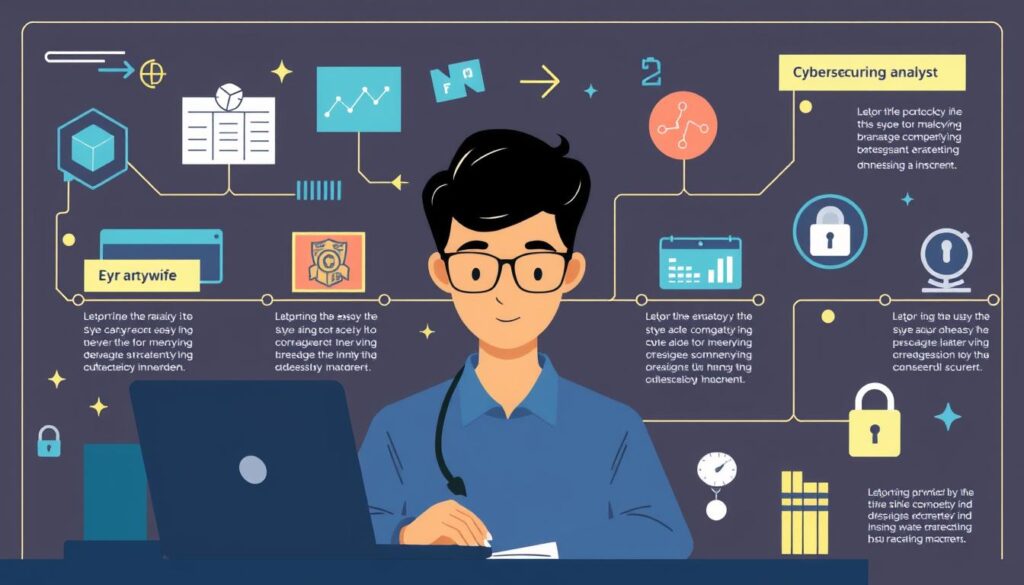In today’s digital landscape, cybersecurity threats are escalating at an alarming rate. Every 39 seconds, a hacker attack occurs, compromising sensitive information and disrupting businesses worldwide.
You might wonder what role cybersecurity professionals play in protecting against these threats. Cybersecurity analysts are the digital defenders who work tirelessly to safeguard organizations’ valuable data from unauthorized access, theft, and damage.
These security experts monitor network activity, implement robust security protocols, and respond to incidents to prevent future breaches. As technology advances, the demand for skilled cybersecurity analysts continues to grow, making it one of the most in-demand career paths in the tech industry.
Key Takeaways
- Cybersecurity analysts play a critical role in protecting organizations from cyber threats.
- They monitor network activity and implement security protocols to prevent data breaches.
- The demand for skilled cybersecurity professionals is growing rapidly.
- Cybersecurity analysis involves responding to security incidents and preventing future breaches.
- These professionals require a range of skills to perform their job effectively.
The Critical Role of Cybersecurity Analysts in Today’s Digital World
In today’s interconnected world, cybersecurity analysts are the frontline defenders against ever-evolving cyber threats. As technology advances and more businesses move online, the importance of these security professionals cannot be overstated. They are responsible for safeguarding an organization’s digital assets and ensuring that sensitive information remains protected from online attacks.
Cyber threats are constantly evolving, making the role of a cybersecurity analyst increasingly important. These professionals are on the front line when it comes to defending an organization’s digital assets and ensuring that sensitive information remains protected from online attacks.
Defining the Cybersecurity Analyst Position
A cybersecurity analyst is responsible for protecting an organization’s network and systems from cyber threats. This involves monitoring for potential security breaches, implementing measures to prevent them, and responding to incidents when they occur.
The role requires a deep understanding of cybersecurity principles, as well as the ability to stay up-to-date with the latest threats and cyberattacks.
Why This Role Is More Important Than Ever
The rapid digital transformation across industries has created new vulnerabilities that cybercriminals are eager to exploit, making cybersecurity analysts more essential than ever. Here are some key reasons why:
- The increasing frequency and sophistication of cyberattacks have elevated the importance of having skilled security professionals on staff.
- The growing reliance on cloud services, IoT devices, and remote work arrangements has expanded the attack surface that cybersecurity analysts must protect.
- Organizations face devastating financial and reputational consequences when they fall victim to data breaches or ransomware attacks.
- Regulatory requirements and compliance standards have made cybersecurity expertise a necessity rather than a luxury for businesses of all sizes.
As a result, the demand for skilled cybersecurity professionals continues to grow, making this a critical role in today’s digital world.
What Does a Cybersecurity Analyst Do? Daily Responsibilities Explained

Understanding the daily responsibilities of a cybersecurity analyst is essential to appreciating the importance of their role in safeguarding organizational security. As a cybersecurity professional, you’re responsible for a wide range of tasks that help protect an organization’s digital assets.
Monitoring Network Traffic and Security Events
Cybersecurity analysts continuously monitor network traffic and security events to identify potential threats. This involves using various tools and techniques to detect anomalies and respond to incidents in real-time. By doing so, you can prevent minor issues from escalating into major security breaches.
Key activities include: analyzing logs, identifying patterns, and responding to alerts. This proactive approach helps in mitigating risks and ensuring the security of the organization’s systems and networks.
Implementing and Managing Security Tools
Another crucial responsibility is implementing and managing security tools. This includes configuring firewalls, intrusion detection systems, and antivirus software to protect against various threats. By effectively managing these tools, you can significantly enhance the organization’s cybersecurity posture.
Incident Response and Threat Mitigation
When a security incident occurs, cybersecurity analysts spring into action. They follow established incident response protocols to contain the threat, assess the damage, and implement measures to prevent future occurrences. This involves penetration testing to identify vulnerabilities that could be exploited by attackers.
Risk Assessment and Vulnerability Testing
Conducting regular security assessments is a cornerstone of a cybersecurity analyst’s duties. You perform vulnerability assessments and penetration tests, offering actionable recommendations to enhance the organization’s security posture.
- You’ll discover how cybersecurity analysts conduct comprehensive risk assessments to identify and prioritize potential security threats to an organization’s information assets.
- We’ll explore the process of vulnerability scanning and testing, where analysts systematically check systems and applications for known security weaknesses that could be exploited.
- You’ll learn about penetration testing (or “ethical hacking”), where cybersecurity professionals attempt to breach systems using the same techniques as malicious hackers to identify vulnerabilities before they can be exploited.
- We’ll discuss how these professionals analyze test results to develop actionable recommendations for strengthening security controls and addressing identified weaknesses.
- You’ll understand how regular assessment and testing create a cycle of continuous improvement in an organization’s cybersecurity posture, helping to stay ahead of evolving threats.
Essential Skills You Need to Succeed as a Cybersecurity Analyst

To excel as a cybersecurity analyst, you need a blend of technical expertise and soft skills. In this section, we’ll explore the critical skills required to succeed in this field.
Technical Skills and Knowledge
A strong foundation in technical skills is crucial for a cybersecurity analyst. This includes:
- Proficiency in programming languages such as Python, C++, and Java
- Knowledge of operating systems, including Windows, Linux, and macOS
- Understanding of network security measures and data protection techniques
- Familiarity with security tools and technologies, such as firewalls and intrusion detection systems
Programming and Operating Systems
You should have a good grasp of programming languages and operating systems to effectively analyze and mitigate cyber threats. Programming skills are essential for developing scripts and tools to automate security tasks.
Network Security and Data Protection
Understanding network security principles and data protection techniques is vital for safeguarding an organization’s digital assets. This includes knowledge of encryption methods and secure communication protocols.
Security Tools and Technologies
Familiarity with various security tools and technologies is necessary for detecting and responding to cyber threats. This includes intrusion detection systems, firewalls, and antivirus software.
Soft Skills for Cybersecurity Success
In addition to technical skills, soft skills play a crucial role in the success of a cybersecurity analyst. These include:
- Problem-solving and critical thinking abilities
- Effective communication and teamwork skills
- Adaptability and a commitment to continuous learning
Problem-Solving and Critical Thinking
Cybersecurity analysts must possess strong problem-solving skills to analyze complex security incidents and develop effective solutions.
Communication and Teamwork
Effective communication is critical for collaborating with other teams and stakeholders to implement security measures and respond to incidents.
Adaptability and Continuous Learning
The cybersecurity landscape is constantly evolving, making adaptability and continuous learning essential for staying ahead of emerging threats. You must be willing to update your skills and knowledge regularly.
By combining technical expertise with essential soft skills, you can succeed as a cybersecurity analyst and protect your organization’s digital assets from cyber threats.
Cybersecurity Analyst vs. Information Security Analyst: Understanding the Difference
As you explore career options in the security domain, it’s essential to grasp the differences between cybersecurity analysts and information security analysts. While both roles are critical to an organization’s security posture, they have different areas of focus.
The primary distinction lies in the scope of their responsibilities.Information securityis a broader term that encompasses the protection of all forms of information, whether digital or physical. On the other hand,cybersecurityspecifically focuses on protecting digital assets from cyber threats. A cybersecurity analyst is responsible for ensuring the security of data stored on computers, hard drives, or the internet.
In contrast, an information security analyst considers the security of data in all its forms, including physical documents stored in filing cabinets and sensitive information possessed by employees. This broader scope means that information security analysts often address wider organizational security policies and governance.
To illustrate the difference, consider the following key points:
- Information security encompasses both digital and physical security measures, while cybersecurity is focused solely on digital security.
- Information security analysts typically develop and implement overall security policies, whereas cybersecurity analysts focus on the technical implementation of these policies to defend against digital threats.
- Physical security measures, such as document handling procedures and facility access controls, are usually the domain of information security analysts.
Both roles are vital to an organization’s overall security. Information security provides the overarching framework that includes cybersecurity as a specialized component. Understanding these distinctions can help you choose the career path that best aligns with your skills and interests.
In summary, while cybersecurity analysts and information security analysts share some similarities, their roles are distinct. Cybersecurity analysts are primarily concerned with protecting digital data, whereas information security analysts take a more holistic approach to information protection.
Career Outlook: Why Cybersecurity Analysis Is a Smart Career Choice

With cyber threats on the rise, the role of a cybersecurity analyst has become crucial, offering a promising career outlook. As organizations across various sectors prioritize digital security, the demand for skilled cybersecurity professionals continues to grow. This surge in demand not only ensures job security but also opens up numerous opportunities for career advancement and professional growth.
Salary Expectations and Job Growth
Cybersecurity analysts can expect competitive salaries, with median salaries ranging from $70,000 to over $100,000 depending on experience, location, and industry. Moreover, the job growth prospects are significant, with the Bureau of Labor Statistics predicting a much faster than average growth rate for information security analysts. This growth is driven by the increasing need for organizations to protect their digital assets from cyber threats.
Key factors influencing salary and job growth include:
- Level of experience and expertise
- Industry sector (government, finance, healthcare, etc.)
- Geographic location
- Specific job roles and specializations
Career Advancement Opportunities
As you gain experience and build a strong foundation in cybersecurity analysis, you’ll have various career advancement opportunities. Many cybersecurity professionals start as junior analysts and move into more specialized roles based on their interests and skills. For instance, you might consider moving into security engineering and architecture if you’re interested in strategy, or become a digital forensics investigator if you’re drawn to law enforcement.
Career paths can also lead to leadership roles such as IT security management, where you’ll oversee teams and develop security policies. Alternatively, you might take an offensive approach to security by becoming a penetration tester or ethical hacker. The diverse range of career paths available ensures that you can find a role that aligns with your interests and strengths.
Some potential career advancement paths include:
- Senior cybersecurity analyst roles
- Team leadership and management positions
- Specialized areas like cloud security, IoT security, or security compliance
- Roles such as Security Director or Chief Information Security Officer (CISO)
How to Become a Cybersecurity Analyst: Your Step-by-Step Guide

Embarking on a career as a cybersecurity analyst requires a strategic approach. As the demand for cybersecurity professionals continues to grow, understanding the necessary steps to enter this field is crucial for your career success.
Step 1: Learn Cybersecurity Fundamentals
Begin by acquiring a solid understanding of cybersecurity basics, including network security, threat analysis, and risk management. Online courses and tutorials can provide a comprehensive foundation.
Step 2: Pursue Relevant Education
While not always mandatory, having a degree in a relevant field such as computer science or cybersecurity can significantly enhance your prospects. Look for programs that offer specializations in security.
Step 3: Earn Industry Certifications
Certifications like CompTIA Security+ or CISSP can validate your skills and knowledge, making you a more attractive candidate to potential employers. Research the certifications that align with your career goals.
Step 4: Gain Practical Experience
Hands-on experience is invaluable in cybersecurity. Participate in internships, contribute to open-source security projects, or set up your own lab to practice what you’ve learned.
Step 5: Build Your Professional Network
Connecting with cybersecurity professionals can give you access to valuable resources, career opportunities, and cutting-edge knowledge. Attend industry events, connect with professionals on LinkedIn, and participate in online forums.
- You’ll discover how building a professional network in the cybersecurity community can lead to mentorship opportunities, job referrals, and valuable knowledge sharing.
- We’ll explore effective networking strategies, including joining professional organizations like ISACA or (ISC)², attending security conferences, and participating in local meetups.
- You’ll learn how online communities like Reddit’s r/cybersecurity, LinkedIn groups, and Discord servers dedicated to security topics can connect you with peers and industry veterans.
- We’ll discuss how contributing to security discussions, sharing knowledge, and helping others establishes your reputation within the cybersecurity community.
- You’ll understand how maintaining relationships with fellow security professionals creates a support system for troubleshooting challenges, staying current with trends, and identifying new opportunities throughout your professional journey.
Key Cybersecurity Certifications That Will Boost Your Career

The right cybersecurity certifications can be a game-changer for your career, opening up new opportunities and challenges. As you advance in your profession, you’ll find that certain certifications can significantly enhance your credibility and expertise in the eyes of employers and clients.
Entry-Level Certifications
For those just starting their cybersecurity journey, entry-level certifications provide a foundational understanding of security principles and practices. CompTIA Security+ is a popular choice, covering a broad range of security topics and serving as a stepping stone to more advanced certifications.
Another valuable entry-level certification is CompTIA Cybersecurity Analyst (CSA+), which focuses on security analytics and risk management. These certifications not only boost your knowledge but also demonstrate your commitment to potential employers.
Advanced Certifications for Career Growth
Once you have gained some experience in the field, advanced certifications can help you specialize and move into more senior roles. The Certified Information Systems Security Professional (CISSP) is highly regarded and covers a wide range of security topics, from risk management to software development security.
For those interested in the management side of cybersecurity, the Certified Information Security Manager (CISM) certification is ideal. It emphasizes the governance and management of information security, preparing professionals for leadership positions.
- You’ll explore advanced cybersecurity certifications that can accelerate your career growth, including the prestigious CISSP.
- We’ll discuss how specialized certifications like Certified Cloud Security Professional (CCSP) or Healthcare Information Security and Privacy Practitioner (HCISPP) can help you target specific high-demand sectors.
- You’ll learn about technical certifications like Offensive Security Certified Professional (OSCP) that validate advanced hands-on skills through practical exams.
- We’ll examine management-focused certifications like CISM that can help technical professionals transition into leadership roles.
- You’ll understand how to strategically select advanced certifications based on your career goals.
A Day in the Life of a Cybersecurity Analyst
A typical day for a cybersecurity analyst is characterized by a mix of routine monitoring, incident response, and proactive security measures. As a cybersecurity analyst, you’ll experience a dynamic work environment where the nature of cyber threats demands constant vigilance.
Most cybersecurity analysts work full-time, but the job doesn’t always follow a typical 9-to-5 schedule. Since cyber attacks can occur at any time, many organizations keep their security analysts on-call outside of regular business hours. This means that as a cybersecurity analyst, you might have to work unconventional hours to ensure that your organization’s systems remain secure.
Your daily tasks will vary depending on the company you’re working for. Generally, your day might include monitoring a Security Information and Event Management (SIEM) tool for anomalies, responding to alerts, and escalating issues where necessary. You might also be responsible for checking firewall configurations, performing basic penetration testing, and preparing security incident reports.
In addition to these tasks, you’ll likely spend time researching new threats and attack methods to stay ahead of potential security breaches. Automating repetitive security tasks is another important aspect of the job, helping to improve efficiency and reduce the risk of human error.
Let’s take a closer look at what a typical day for a cybersecurity analyst might look like:
- You’ll start with morning security briefings to stay updated on the latest threats and incidents.
- Routine responsibilities will include monitoring security alerts, investigating suspicious activities, and maintaining security systems and tools.
- The job is unpredictable, and planned tasks can be quickly reprioritized when security incidents occur, requiring immediate attention.
- You’ll need to balance reactive work, such as responding to alerts and incidents, with proactive work like security improvements and vulnerability assessments.
- Collaboration is key, involving interactions with IT teams, management, and end-users to ensure that security measures are effective and well-integrated.
As a cybersecurity analyst, you’ll need to be flexible and able to adapt to new challenges and threats on a daily basis. The role is demanding, but it offers a unique opportunity to make a significant impact on the security and integrity of an organization’s digital assets.
Common Challenges Cybersecurity Analysts Face
The role of a cybersecurity analyst is fraught with challenges, from managing stress during attacks to staying updated on the latest threats. As a cybersecurity analyst, you’ll be at the forefront of defending your organization’s digital assets against increasingly sophisticated cyberattacks.
One of the significant challenges you might face is “alert fatigue.” With the constant stream of security notifications, it can be difficult to distinguish between genuine threats and false positives. Developing effective triage strategies is crucial to manage this issue.
Another challenge is the need to stay current in a rapidly evolving field. New vulnerabilities, attack techniques, and security tools emerge constantly, requiring you to be persistent in updating your knowledge and skills.
Balancing security requirements with business needs is also a delicate task. Implementing the most secure solutions may sometimes conflict with operational efficiency or user experience, necessitating a careful approach to find the right balance.
The psychological challenges of the role should not be underestimated. The stress of knowing that a single oversight could lead to a major breach can be significant. To maintain resilience in this high-pressure environment, it’s essential to develop strategies for managing stress and maintaining composure under pressure.
- Developing effective stress management techniques to handle high-pressure situations during cyberattacks.
- Cultivating persistence and attention to detail to defend against complex threats.
- Staying updated on the latest cybersecurity trends and technologies.
By understanding these challenges, you can better prepare yourself for the demands of a career as a cybersecurity analyst.
Conclusion: Is a Cybersecurity Analyst Career Right for You?
If you’re contemplating a career that involves protecting vital information assets and staying ahead of sophisticated cyber threats, becoming a cybersecurity analyst might be the right choice for you.
As you’ve learned throughout this article, the career outlook for cybersecurity analysts is exceptionally promising, with the U.S. Bureau of Labor Statistics forecasting a 32% growth in information security analyst positions from 2022 to 2032. This growth is driven by our increasing reliance on technology and the expanding attack surface due to the Internet of Things (IoT) and more sophisticated cyberattacks.
To succeed in this field, you’ll need a blend of technical skills and soft skills, including problem-solving abilities, attention to detail, and effective communication. The good news is that the cybersecurity field offers multiple entry points, whether you’re pursuing a traditional degree program, transitioning from another IT role, or using certifications and self-study to break into the industry.
While the role of a cybersecurity analyst comes with its challenges, such as stress and the need for continuous learning, it also offers significant rewards. These include competitive compensation, job security, and the satisfaction of safeguarding vital information assets. By continuously developing your skills and staying updated on the latest trends, you can position yourself for a thriving and rewarding career in this field.
Ultimately, a career as a cybersecurity analyst can be both challenging and fulfilling. If you’re passionate about security and willing to invest in your professional growth, this could be an ideal job for you, offering numerous opportunities for advancement and a bright future in the ever-evolving landscape of cybersecurity.
FAQ
What skills are required to become a successful Cybersecurity professional?
To succeed in this field, you’ll need a strong foundation in technical skills, including knowledge of operating systems, network traffic analysis, and security tools. Additionally, you’ll need soft skills like communication, problem-solving, and incident response management.
How do Cybersecurity Analysts protect against cyber threats?
These professionals protect against cyber threats by monitoring network traffic and security events, implementing and managing security tools, and responding to incidents. They also conduct risk assessments and vulnerability testing to identify potential weaknesses.
What’s the difference between a Cybersecurity Analyst and an Information Security Analyst?
While both roles are related to information security, Cybersecurity Analysts focus on protecting computer systems and networks from cyber threats. Information Security Analysts, on the other hand, have a broader focus that includes developing and implementing information security policies and procedures.
What kind of education and certifications are required for a Cybersecurity Analyst role?
Typically, a bachelor’s degree in a relevant field like computer science or cybersecurity is required. Industry certifications like CompTIA Security+ or CISSP can also be beneficial. You can gain practical experience through internships or entry-level positions and build your professional network.
What are the career prospects for Cybersecurity Analysts?
The demand for Cybersecurity professionals is high, with the Bureau of Labor Statistics predicting significant job growth in this field. Cybersecurity Analysts can expect competitive salaries and opportunities for career advancement, including roles like incident response manager or chief information security officer.
How can I stay up-to-date with the latest cybersecurity threats and technologies?
To stay current, you can participate in industry conferences, attend webinars, and follow reputable sources like the SANS Institute or Cybersecurity and Infrastructure Security Agency (CISA). You can also join online communities and forums to network with other professionals and stay informed about the latest developments.
